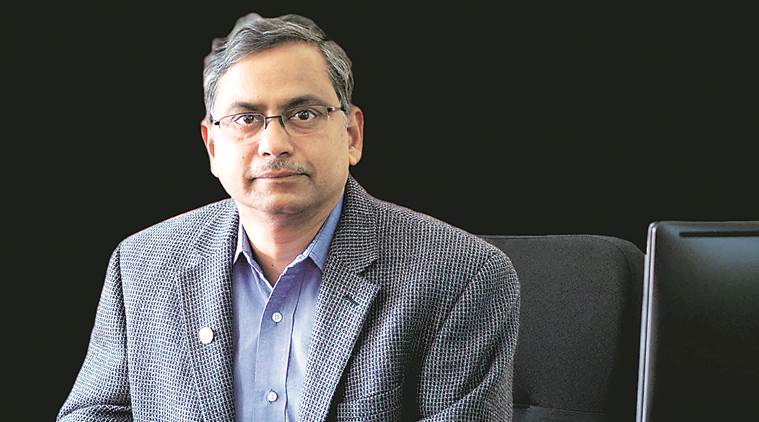 Kishore M Paknikar, Director, Agharkar Research Institute, in Pune
Kishore M Paknikar, Director, Agharkar Research Institute, in Pune
Despite the Centre’s efforts with the Innovate in India, Start-Up India and Make in India programmes, there are not many Indian industries that are willing or capable of absorbing new technologies coming out of research laboratories. Still, despite fewer jobs for PhD scholars and falling budgets for scientific research in India, Kishore M Paknikar, director, MACS-Agharkar Research Institute (ARI), tells The Indian Express that the environment in India is conducive for research scholars to become entrepreneurs.
Q. ARI completes 72 years this year. Can you highlight a few key researches and the journey so far?
Over the last seven decades, the institute has produced over 400 PhD scholars and published over 2,700 research papers. Some significant achievements include the successful market launch of a nanosilver gel meant for treating burn wounds, bed sores and diabetic ulcers, creation of a digitised database of medicinal plants of Maharashtra, discovery of several new species of plants, diatoms, fungi, lichens and bacteria, particularly those found in the Western Ghats, and establishment of the National Fungal Culture Collection of India. Significant ongoing works include those on developmental biology of zebrafish, hydra and fruit fly. These studies could hold the answers to numerous underlying human diseases and organ regeneration.
Q. Can you elaborate on research and commercialisation of products from the institute’s research on agriculture, cancer and diabetes?
Under agriculture, the institute has so far developed twelve varieties of wheat, eight varieties of soybean and one variety of grape, which are predominantly cultivated in Maharashtra and Karnataka. Our crop varieties have not only had large economic impact but have also shown characteristics of being rich in micronutrients. They have remained disease-resistant, are of high yield and capable of early maturing. An estimated 6.8 lakh tonne of MACS-ARI wheat is grown over 2.72 lakh hectare of land, which equates to an annual contribution of Rs 1,360 crore to the country’s economy. Similarly, our yearly soyabean production is as much as 2.7 lakh tonne, equivalent to Rs 680 crore. Several products and processes are ready in the pharmaceutical and diagnostics sectors, including those for treating fungal infections and diabetes, field-usable test kits and devices for rapid on-site detection of human and animal disease, and an android mobile application for estimating haemoglobin in blood samples. Still, many of our promising research findings in these areas are awaiting translation into commercial technologies. Commercialisation of inventions, unlike in other developed countries, is a big challenge in India. There are not many Indian industries that are willing or capable of absorbing new technologies coming out of research laboratories. The government is trying to promote entrepreneurship and indigenous manufacturing through its flagship programmes like Innovate in India, Start-Up India and Make in India, and has been keen towards establishing industry-academia collaborations. We expect Indian industries to take full advantage of this conducive environment and partner with result-oriented research institutes by investing in research and development.
Q. More youngsters are turning towards pursuing basic sciences as a career. How do you see this trend? Are there enough jobs in India?
Though it is heartening to see that youngsters are willing to pursue basic science as a career, funding and job opportunities for basic research are declining across the globe. In India, the situation is more critical and many PhD scholars are not finding proper jobs. Partly, this is because of the varying qualities of the scholars. On some occasions, their training is poor or the doctoral studies curricula is able to produce narrowly focused researchers and not critical thinkers. In my opinion, there is a huge gap between the supply and demand for PhD scholars in India. There is an urgent need to bridge this gap by creating newer jobs.
Q. The budget for doing scientific research is bothering scientists. Your comments and suggestions.
The ‘availability’ of budget for doing scientific research has indeed become a serious issue. Many research projects are suffering because of reduced funding, delayed release of funds, curtailment of staff and other issues. For instance, the staff strength of the Indian Council of Agricultural Research (ICAR)-funded All India Co-ordinated Projects on wheat and soybean at ARI, has been curtailed by 50 per cent. Similar curtailments were realised at all organisations without considering their performance or track records. The employees of autonomous institutes like ARI have been granted salaries as per the Seventh Pay Commission, with the government bearing only 70 per cent of the additional costs. As a result, scientists will have to earn 30 per cent of their salaries through commercial and revenue-generating activities. These cost-cutting exercises affect the morale of scientists. What probably needs to be done is to identify specific time-bound targets and challenges faced by the country, assign them to institutes having necessary expertise along with adequate financial support and expect solutions.
Q. You have mentored and turned research students into entrepreneurs. Can this model be replicated by other institutes, too?
Yes, I strongly believe that this model is replicable in other institutes, too. Several of MACS-ARI students have started their own enterprises and are benefiting society, industry and generating employment. Today, ARI is in a position and is willing to conduct skill-based training courses to further the Skill India programme of the Ministry of Skill Development and Entrepreneurship by the Union Government.
Q. What are MACS-ARI’s future plans?
MACS-ARI plans to boost its Public Private Partnership (PPP) capabilities through MACS-Technology and Education Foundation (MACS-TEF), which was registered as a Section 8 Company under the Companies Act, 2013. We also wish to undertake educational activities in specialised areas of our expertise. Our collaborations have extended to universities and institutes in the US, UK, Germany, Switzerland, Canada, Poland, Japan, China, Russia, Korea and Mexico, for undertaking collaborative research and development works and to facilitate exchange programmes for faculty and students. In the future, ARI hopes to rope-in industries from abroad and licence out technologies.